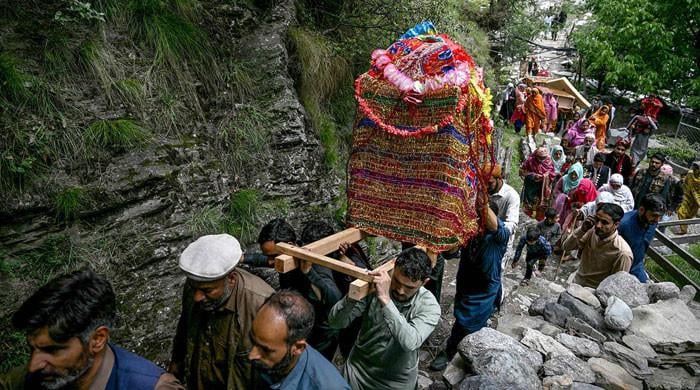Weddings Proceed in Azad Kashmir Despite Heightened Tensions
Amidst the looming threat of conflict with India, Rabia Bibi, adorned with a vibrant red dupatta, remained determined to proceed with her wedding in a remote region of Azad Jammu and Kashmir (AJK).
“Even during our childhood, we faced similar circumstances, but we remain unafraid. We will not be deterred,” the 18-year-old shared with media representatives, shortly after arriving in a flower-decorated “doli” carriage.
“Our desire is for tranquility, so that our lives remain undisturbed,” expressed the bride, glowing with gold bracelets, a jeweled headpiece, and an intricately embroidered scarlet dress.
At the ceremony, which commenced with a chicken sacrifice, Chaudhry Junaid, the groom, equally magnificent in his detailed sherwani and red-and-gold turban, echoed the sentiment of defiance.
“While there is unease and apprehension, we have not called off any time-honored rituals,” stated the 23-year-old chef.
Relations between the two nuclear powers have intensified following accusations from India that Pakistan supported an attack that resulted in the deaths of 26 civilians in Indian Illegally Occupied Jammu and Kashmir (IIOJK) on April 22, though no substantiating evidence was provided.
Indian Prime Minister Narendra Modi has granted his military forces “complete operational autonomy” to retaliate to the aforementioned assault.
Last week, Islamabad communicated that they possessed “reliable intelligence” suggesting that India was preparing for imminent offensives.
The international community has applied pressure on both New Delhi and Islamabad to de-escalate the situation.
On the Pakistani side, mock emergency exercises have been conducted in open areas, inhabitants have received instructions to stockpile provisions and medications, and religious institutions have been temporarily closed.
Within Indian Illegally Occupied Jammu and Kashmir (IIOJK), an extensive search for the alleged perpetrators is underway, while individuals residing near the border are either relocating further inland or reinforcing their shelters in anticipation of potential hostilities.
Since the conclusion of British colonial rule in 1947, India and Pakistan have engaged in multiple conflicts over the contested Himalayan region.
Civilians residing on either side of the divided, predominantly Muslim region frequently find themselves as the initial victims caught amid clashes.
In a checkpoint-free area of the scenic Neelum Valley, a popular tourist destination that was recently closed, Indian-controlled territory lies across the river that flows through the mountainous landscape.
Local inhabitants mentioned that Pakistani officials have advised them to maintain vigilance due to the possibility of a military confrontation.
In another village, Shoaib Akhtar, a mechanical engineer, was also celebrating his wedding.
“This represents the most joyous occasion of our existence, and we refuse to allow anything to overshadow it,” declared Akhtar, the 25-year-old groom, surrounded by loved ones.
“At this moment, my focus is on my wedding, which is paramount. Should conflict arise, we will address it accordingly,” he further commented.
“We are content, and if India harbors grievances, we remain unconcerned,” Bibi asserted.
“We remain steadfast and are prepared to defend our interests and our nation.”



Comments (0)
No comments yet. Be the first to comment!
Leave a Comment